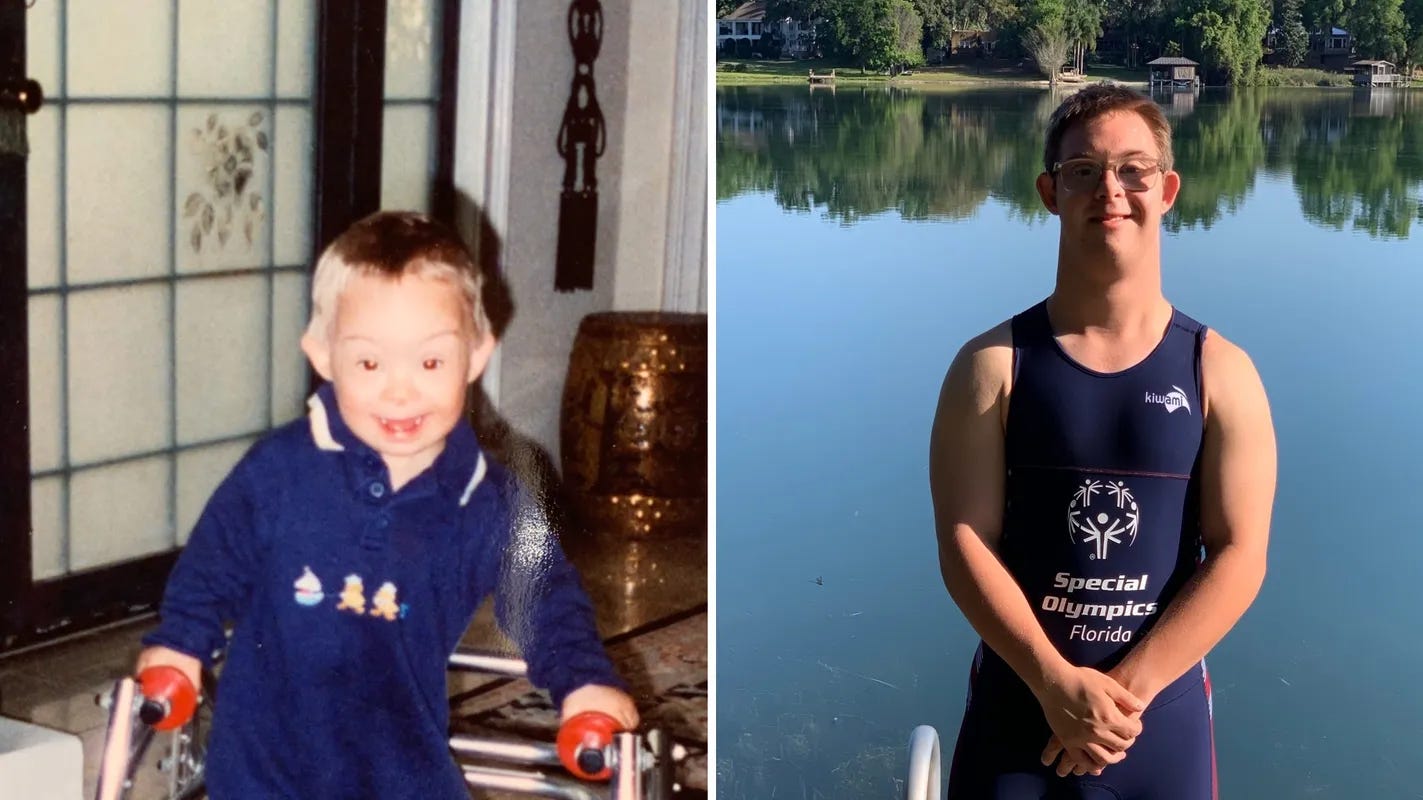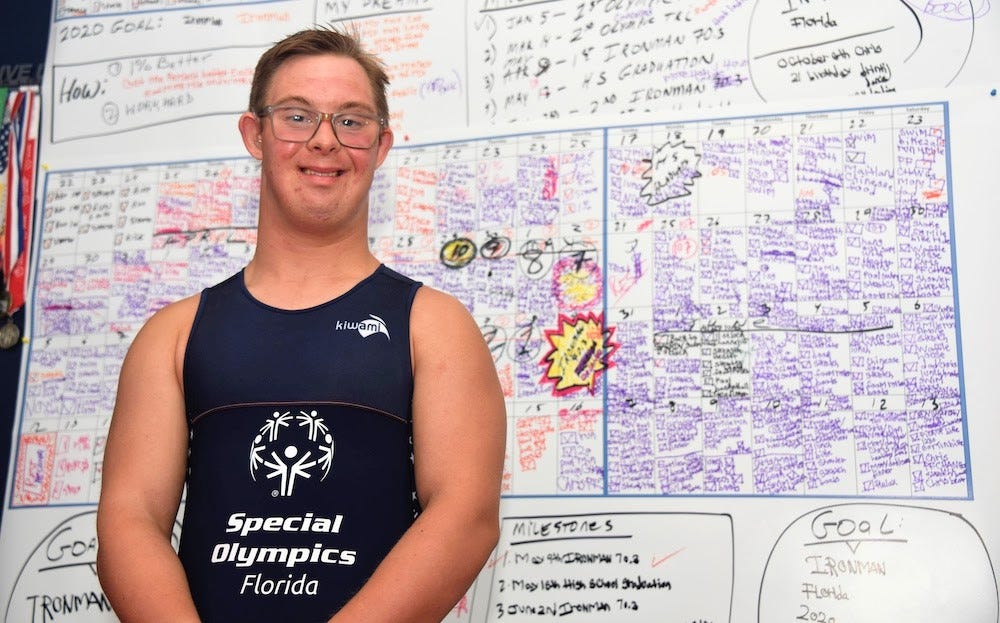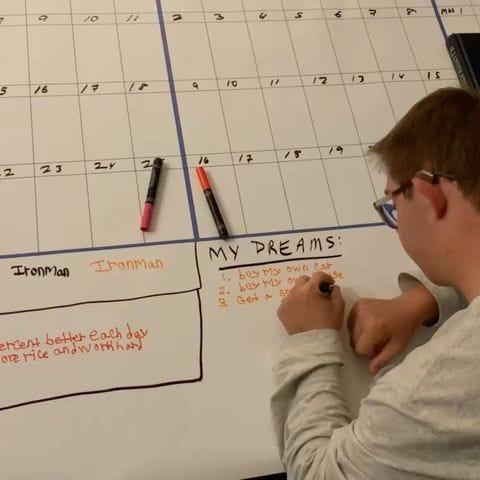New Beginnings
Are you okay? I am hoping for a 2021 with less conflict and more joy, less Covid and more hugs, less anxiety, and more resilience. I am thinking we could all use some inspiration...
New Beginnings
Are you okay? How are you holding up?
I am hanging in there and hoping for a 2021 with less conflict and more joy, less Covid and more hugs, less anxiety, and more resilience.
Seems we could all use some positive inspiration. For me, it means directing my energy to what’s right with the world, instead of what’s wrong.
So, during the lockdown I started work on a new book and research on a new project that combines my biggest passions: solutions-focused stories and research on resilience and health. In the process, I realized my own outlook improved by reading about people who are invested in solutions, rather than being glued to my screens on the events of the day.
At least once a month, I will share with you an interview, a resource, or a look behind the scene, featuring someone who found an effective solution to improve their health or a well-researched resource you can use in your own life.
This month, I spoke with Chris Nikic, the first person with Down Syndrome to complete an Ironman competition. This doesn’t sound like it will apply to most of us, but I found the way he did it, his 1%-Better-Challenge, to be a useful tool we can all benefit from. Maybe you will, too.
Enjoy! And let me know what you think!
Michaela
P.S. Many of you have signed up for my newsletter about women in Buddhism. If you do not want to participate in this new endeavor, it only takes one click to hit the unsubscribe button. You will still receive the newsletter you originally signed up for.
1 Percent Better Every Day
Chris Nikic is the first person with Down Syndrome to finish an Ironman triathlon. On November 7, 2020, he swam 2.4 miles, rode his bike 112 miles, and then ran a 26.2-mile marathon in under 17 hours, securing his entry in the Guinness Book of World Records. I spoke with the 21-year old athlete from Orlando, Florida, and his father, Nik Nikic, a business coach, about why he is running not only for himself and why he works to become 1 percent better every day.
Photos: Nik Nikic.
Michaela: Congrats! How was the race? Was there a moment when you thought of giving up?
Chris: The bicycling part was a challenge. Around mile 40, I got bit by fire ants, and by mile 50, I crashed. Dad pulled me to the side and said, “What’s more important, your back pain or your dream?” I said, “My dream.” Then I took off and made good time.
How were the reactions to your record?
Chris: Lots of hugs!
Nik: The neighbors did a 5K walk with us; all the neighbors joined. The Florida governor showed up and honored him. And Chris, what happened when you went to the soccer game?
Chris: They honored me.
Nik: What did they say?
Chris: That I’m adorable.
To understand what an accomplishment this is, Chris, we have to mention that you had your first open heart surgery at five months old. You couldn’t walk on your own until you were four. How does the sport help you?
Chris: I play golf, basketball, I did track, tons of other sports. A year ago, I decided to look at myself in the mirror and said, Do your Ironman, because when someone does the Ironman, that person accomplishes their dreams.
Do you have to train harder than other athletes?
Nik: Down Syndrome has several characteristics that make it harder for him than for others. He probably has to train five or ten times harder to develop the muscle tone. Challenge number 2 is poor balance. He didn’t learn to ride a bike until he was 15 years old. He cannot get on the bike by himself, so someone has to hold him and get him started. Every 30 minutes, he gets off the bike to drink because he cannot drink and hold the balance at the same time. At Mile 40, he stopped near a heap of fire ants who bit him, and his ankles swell. Third, we had to teach him to improve his reaction time, to avoid a collision or an obstacle when he’s going that fast. We’ve overcome a lot of the obstacles that are inherent in Down Syndrome, but we’re looking at them as opportunities to get smarter and better.
Chris: My biggest challenge is that I like my couch, videos, and pizza.
Chris, you are tethered to your coach Dan Grieb during swimming and running, but he is not allowed to actually help you or push you, right? How does this work?
Chris: He challenges and guides me on the swim and the run.
Nik: At the next Ironman, no more tethers. This was just the first time to get him comfortable.
How did you set your eyes on the Ironman in the first place?
Nik: A year ago, after finishing his first open water 1K-swim, Chris wrote on a wall, “Chris World Champ.” We thought about what he could become a world champion of and learned that no one with Down Syndrome has ever finished an Ironman.
Chris: The Ironman is to inspire everyone. Kids with Down Syndrome have been discounted. The doctors and experts are saying we can’t do much. Now parents are sending me messages; I’m the hero to their kids. I’m adorable. Cut the experts off!
Nik (pats Chris on the back): Relax, buddy, you’re very passionate about this!
Chris: I am!
Nik, I heard that experts and clinicians indeed advised you not to expect too much of your son, and that limited you, didn’t it?
Nik: Yes, the expert opinions limited our own thinking what he could and couldn’t do. Two years ago, we stopped listening to everybody around us. We let Chris tell us what his dreams are, what he can and cannot do. Let go of the preconceived notions. He surprised us. To train for an Ironman within a year is difficult for anybody, let alone for somebody with Down Syndrome. At 17, he had four ear surgeries and was told he could never swim. We overcame that, too. If he can overcome all these obstacles, now we really don’t know what else he is capable of.
What else would you like to accomplish, Chris?
Chris: To have my own car, my own house, and to marry a smoking hot blonde from Minnesota. That’s a very important key to the concept.
Why does she have to be blonde and from Minnesota?
(Chris picks up a framed photo.)
Nik: That’s our wedding picture. My wife Patty, his mom, is blonde and from Minnesota.
Chris: I basically want his house, his company, my car, and smoking hot wife!
Nik: Baby, you gotta earn your own.
Ouch! (They playfully box each other.)
Nik: We have a big whiteboard in his room where we write down his goals and dreams and what he does every day. The beauty of that big board is, it starts out empty, and then as we fill it, we see progress. He has his goals in front of him every day. A lot of people get lost in everyday stuff, so we keep our eyes on the goals.
Nik, How do you strike a balance of supporting and challenging him but not pushing him too hard?
Nik: It’s always about his dreams and his goals. I make sure he understands and verbalizes his dreams. They are so powerful that the effort pales in comparison. We talk about his dreams and goals every day, write them down, discuss them, review them. And then when it’s time to work, the question is, what’s more important, your pain or your dreams? The answer is always, my dreams. So I just help Chris verbalize really big dreams.
Nik, you are a corporate coach. I can see the principles of corporate motivation coaching at work here.
Nik: He’s the best, the most coachable student I’ve ever had. He gave a talk to an audience of 1,000 people. People love to connect with him.
Chris: I am a public speaker, I’m single, I’m adorable.
Chris, you are wearing a bright orange tee with the slogan “1% Better.” What is the 1%-Better-Challenge?
Chris: It’s about getting better every day. A year ago, I started with 1 pushup, 1 sit-up, and 1 squat. Now I do 200 sit-ups, 200 pushups, and 200 squats. Next year, I’ll do 500 sit-ups, pushups, and squats. They also make a cute butt, and the ladies really like that. This impresses every single blonde who comes into my life.
Nik: The concept is to just improve a little bit each day. And the challenge is to create awareness to have able-bodied people like you and me help others to do the same.
The challenge is not just for you, Chris, but for others to help other people get better.
Nik: You can’t do it alone. Very few people can train for an ironman by themselves. Chris has buddies, and trainers, and friends. The challenge is for others to copy this model and create a community to help people like Chris achieve their best.
You already mentioned you saw Chris improve his coordination. Do you see improvements in other areas as well?
Nik: Yes, he has grown intellectually and emotionally; he remembers things much better and learns skills much faster. He is clearly more capable. Three months ago, he wouldn’t have been able to do this interview and understand your questions so well. Everything is working much better. For us, this whole journey is about his physical development, his mental health, but most importantly, it’s about inclusion and the community we have never had before. He has a group of friends around him who adore him and look up to him. The greatest reward out of all of this has been the community of friends and family we’ve created. We hope we can spread this message to everybody else. Because I know how much we enjoy watching our son interact with the community, we’d love nothing more than seeing all these other families with special needs kids interact and being part of the community they live in. We are continuing to promote the 1% challenge, which is each one helps another one. Maybe we can create our community of inclusion and help everyone to join.
How can people participate in the 1% Better Challenge?
Nik: Our mission is really just to get people thinking that way and get them started. We offer a t-shirt because it is a visual way to remember things. With or without the t-shirt, it is about the motivation to get better each day, to go out and help others. If we create a movement, where everybody is talking about getting 1% better and is looking for someone else they can help, we have made a difference. We will offer resources on our website, because there is more to it. It’s a whole philosophy. There is a right way to do it and a wrong way. The way we are teaching people is to create a lifelong habit of good practices. Watching Chris, I have learned one lesson about kids with Down Syndrome. That is, their learning curve is so different that we confuse it with no learning curve. A year ago, he was the slowest kid of all the Special Olympics kids; now he is surpassing them, and they are thinking about doing an ironman or a half ironman. So this is the message: It’s not that they can’t do it. We as parents just have to be patient until that growth curve kicks in.
What’s next on the dream list, Chris?
Chris: I’m doing the Ironman Hawaii next year, and I got invited to the Special Olympics USA in 2022, to inspire other kids. So that other parents say, “Look at this kid, he’s going to the Ironman Hawaii!”
Hug! When it gets hard, I gotta hug my dad.
Nik: You are amazing. I love you, baby. Hugs make everything better, don’t they?
Watch Chris in action:




